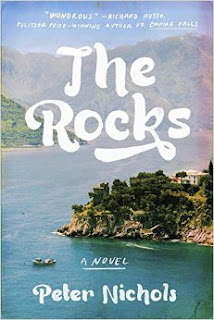%2Bp.%2B330_0.jpg)
Do you do it? I've had a couple of reasons to think about this lately and thought I'd throw it out there. Personally, I'm not much of an underliner, and while we're at it, let's throw in any kind of marking in books--maginalia, highlighting, whatever. I think there are a couple of reasons I didn't develop the habit. First, although it's not so true recently, most of my life I've gotten a lot of my books from the library, and it doesn't seem good form. Although now I think of it, I don't really mind underlining in books when it's fairly unobtrusive. And I've seen some interesting marginalia in my day. Once, I am fairly I came across the marginalia of a guy I liked in school, and that was fun, although it felt a bit like spying. And another time, I read a book by Reynolds Price out of the San Francisco Public Library and I have a feeling that the person who wrote in those books had some kind of kinky thing about one of Price's characters, although I am not sure that I ever really figured out what was going on there.

Another reason, though, is that my mind is not all that organized. For similar reasons, I am not a good note taker. I seldom know exactly what it is I'm going to want for later. There was a period in my life when I wrote down long passages of books and articles in my notebook, and let's just say that aphorisms these were not. If I really liked something I tended to write down almost all of it. I would not be happy coming across a book if underlined in the way I copied.
We were down over the weekend going through my recently departed aunt's books. I used to work in a bookstore and my aunt and I shared a literary interest, so I gave her a lot of books over the years. Too many books, really, because unlike most people, she pretty much always took it upon herself to read them. I knew this from our discussions afterwards, but if I'd had any doubt, I would be sure now, as skimming through some of the titles I'd given her, I found them underlined right through.
My aunt was much more organized in her studies than I ever was, and you can tell it from her underlining. As in the Goldilocks story, there is not too much nor too little, it is just right. A sentence or two underlined here or there, with a star or maybe a word or two comment in the margin. If I ever do take to underlining, which I might, I would try to follow her method, as it is a good one.
I had another experience having to do with underlining et al. Every couple of weeks some friends and I get together in a pub and read Finnegans Wake together. And of course, given that there are seven or so of us, the group does include a fair number of underliners. A man from the bar, a tippler I would say, came over to our table and stared out the window by us, wobbling a little on his legs as he stood there. Eventually, he asked, as everyone does, what we were reading. One of our members obliged him. The man stood there for a moment and then said, "I hate people who write in books." My friend, a much kinder spirit than, say, I am said, without looking up, "I'm sorry to have made your bad list." The man, unappeased tottered off to the rest room.
Sometimes I take notes, sometimes I don't. It really doesn't matter, as I can't read my own handwriting half the time anyway. I am very much afraid that if we do Finnegan begin again, it will be as if for the first time, no matter how many incoherent notes I find written mysteriously in the margins.
Here's a
link I found to some famous writers and their scribbling in other people's books.





































%2Bp.%2B330_0.jpg)











